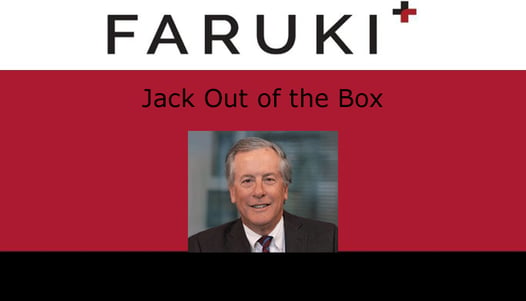- September 26, 2023
- Jack Greiner
- Jack Out of the Box
 The Faruki firm recently helped several clients prevail on an appeal of an earlier grant of summary judgment in a defamation case involving Google and several other entities. According to Shawn Weiler, the plaintiff in the case, the defendants indexed or otherwise shared information concerning a case against the IRS which Weiler had previously filed. Mr. Weiler's suit failed because he could not establish that the information was false.
The Faruki firm recently helped several clients prevail on an appeal of an earlier grant of summary judgment in a defamation case involving Google and several other entities. According to Shawn Weiler, the plaintiff in the case, the defendants indexed or otherwise shared information concerning a case against the IRS which Weiler had previously filed. Mr. Weiler's suit failed because he could not establish that the information was false.
In October of 2017, Mr. Weiler sued the Internal Revenue Service in the United States District Court for the Northern District of Ohio in a dispute over his federal income tax. The records pertaining to the lawsuit were publicly available on Pacer, the federal court's electronic filing system. Weiler subsequently appealed the decision from his federal suit on August 1, 2019. According to Mr. Weiler, during the four years that followed, he had difficulty finding employment. He eventually learned from a job recruiter that a potential employer refused to hire him because an internet search of his name revealed the lawsuit and appeal against the government.
Thereafter, Mr. Weiler conducted his own internet search of his name, utilizing the Google search engine. The search returned the results of his federal lawsuit on several websites. Mr. Weiler attempted to remove any reference to the lawsuit from online public access. In May of 2022, Mr. Weiler filed a complaint in the Cuyahoga County Court of Common Pleas along with a motion for a temporary restraining order against the defendants, alleging they'd libeled him based on their roles in indexing, linking, or otherwise making the records of his federal lawsuit available online to the public.
Mr. Weiler contended that Google recklessly indexes websites with no regard for the consequences of its search results. He also claimed that that Pacer allows Google to return search results from its website without his permission, allowing access to his personal, sensitive information. In Mr. Weiler's estimation, that conduct damaged his reputation and caused him to suffer economic harm.
The defendants filed motions to dismiss the complaint, because they were time barred and because Mr. Weiler failed to allege that any defendant said anything false about him. The trial court granted the motions, and Mr. Weiler appealed that ruling. In its ruling, the appellate court focused on Mr. Weiler's failure to allege falsity.
As the appellate court noted, a libel plaintiff must prove five elements – a false statement of fact, a defamatory meaning, publication, injury, and some degree of fault on the part of the defendant. Mr. Weiler tried to work around this checklist by arguing that "[d]ue to the widespread public access to his lawsuit information, . . . falsity is not required to prove his libel claim." The Court had none of it. As it ruled, "[i]t is well settled that to prevail, a private person making a defamation claim must prove a false and defamatory statement was made about the claimant. . . . Since falsity is an essential element of a defamation claim, a true statement cannot provide the basis for such an action. . . . Also, facilitating public access to Weiler's information that may be unfavorable, although truthful, is not defamation. Given Weiler's failure to allege any false statement made by Appellees, his claim of defamation fails."
The appellate court noted that Mr. Weiler also appealed the lower court's ruling that his claim was time barred. In Ohio, a plaintiff must bring a libel action one year from the statement is published. Here, Mr. Weiler filed his lawsuit in 2022, based on statements that were "published" in 2017 and 2019. The math was decidedly not in Mr. Weiler's favor. And perhaps he realized this fact, given that he failed "to offer a legal basis for is argument that his libel claims are not time-barred." For this reason, the appellate court did not even consider this alternate ground for appeal.
Mr. Weiler attempted to put the cart before the horse here by arguing that the impact of the statements – true or false – harmed his reputation. But a plaintiff can't proceed without evidence to support an essential element. That's what makes them essential after all.
